Unit 9 Learning_高一英语北师大版(2019)必修第三册教材习题精讲课件(共46张)
文档属性
| 名称 | Unit 9 Learning_高一英语北师大版(2019)必修第三册教材习题精讲课件(共46张) | 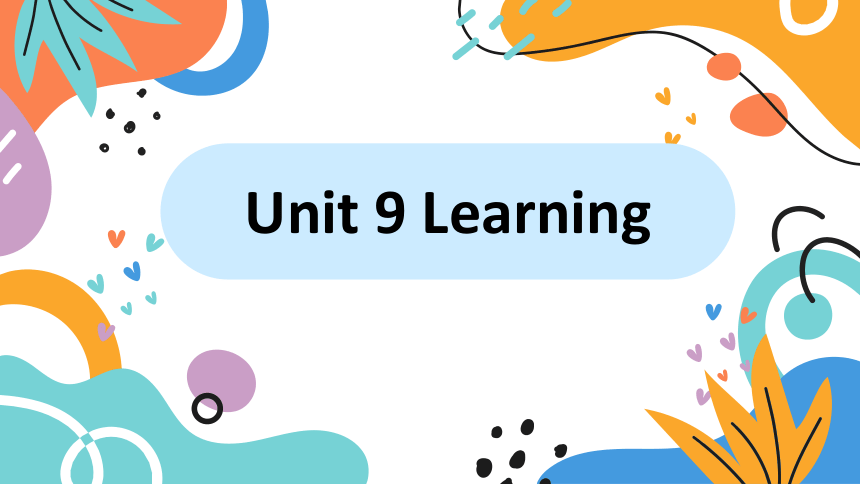 | |
| 格式 | pptx | ||
| 文件大小 | 901.6KB | ||
| 资源类型 | 教案 | ||
| 版本资源 | 北师大版(2019) | ||
| 科目 | 英语 | ||
| 更新时间 | 2025-04-02 21:50:13 | ||
图片预览

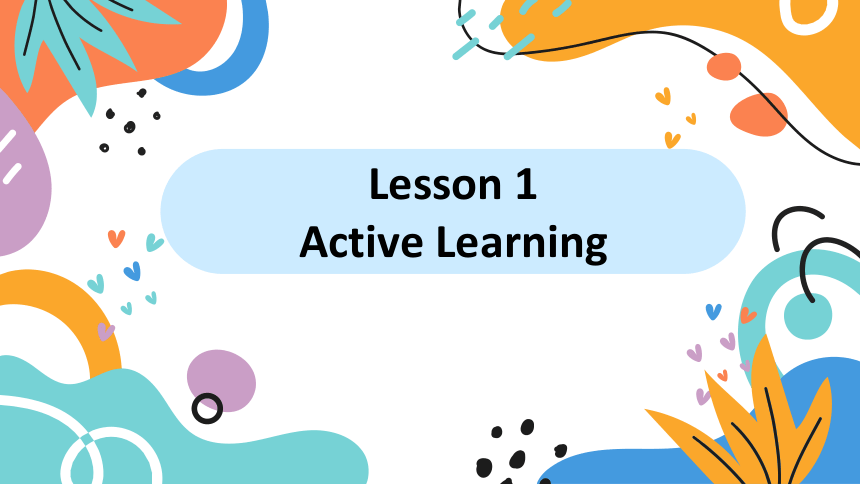
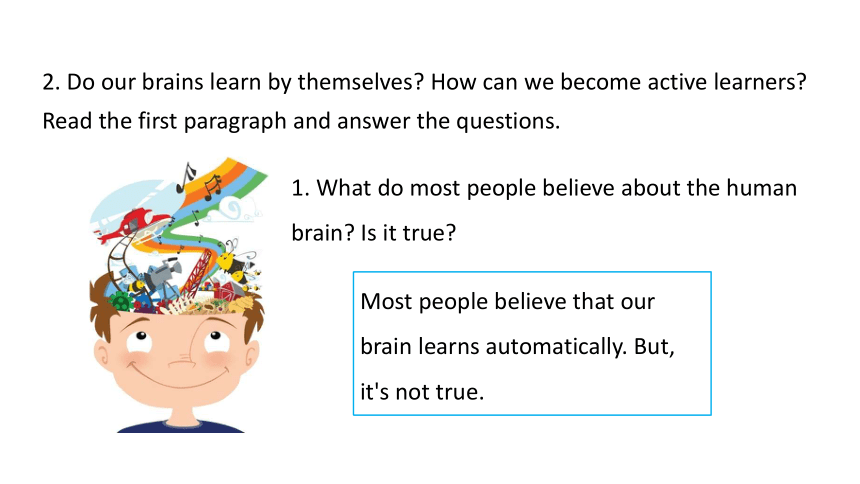

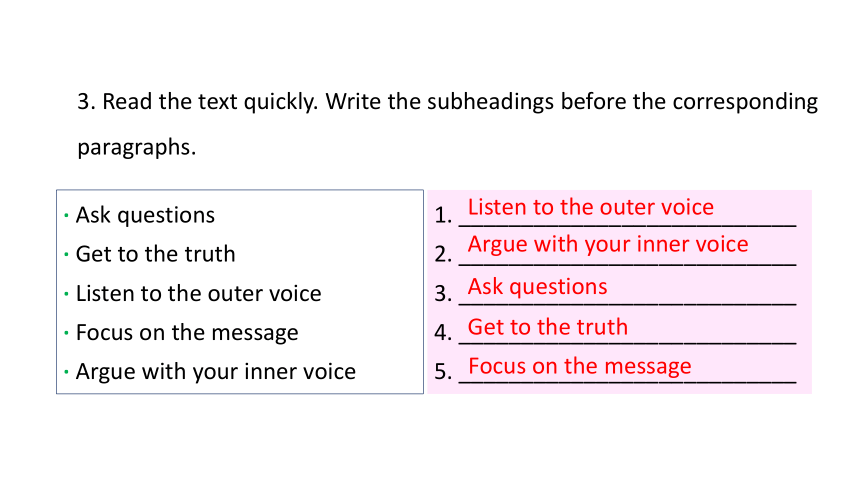
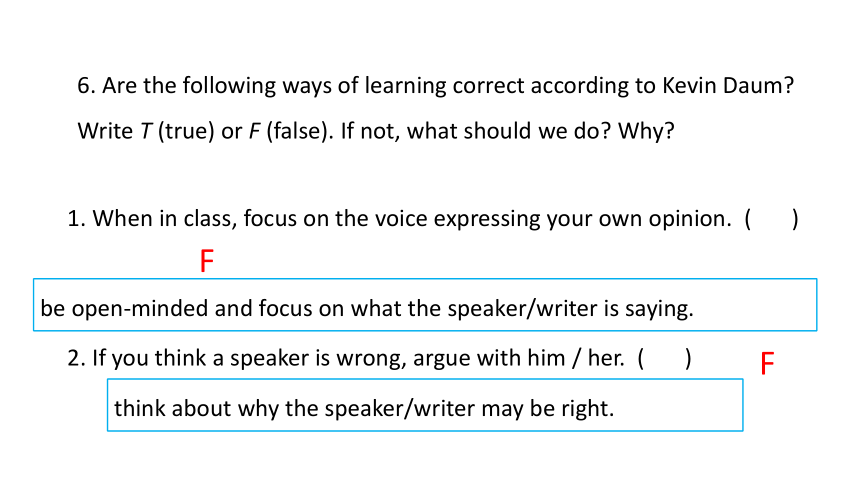
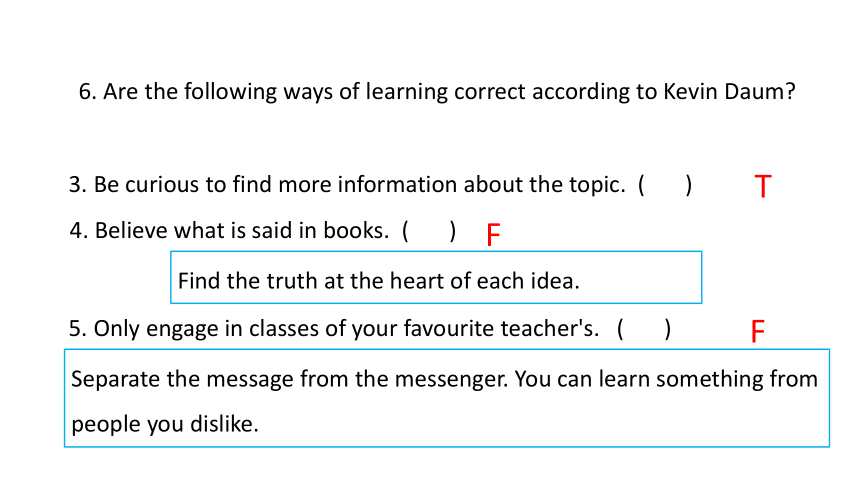
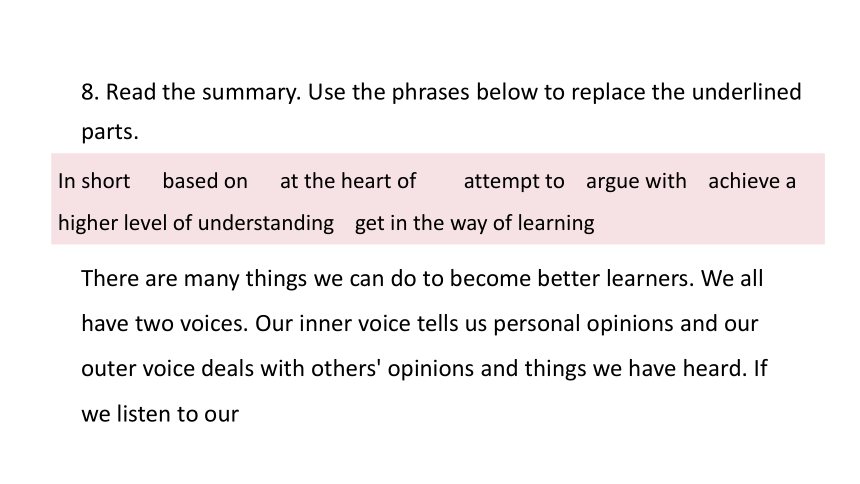
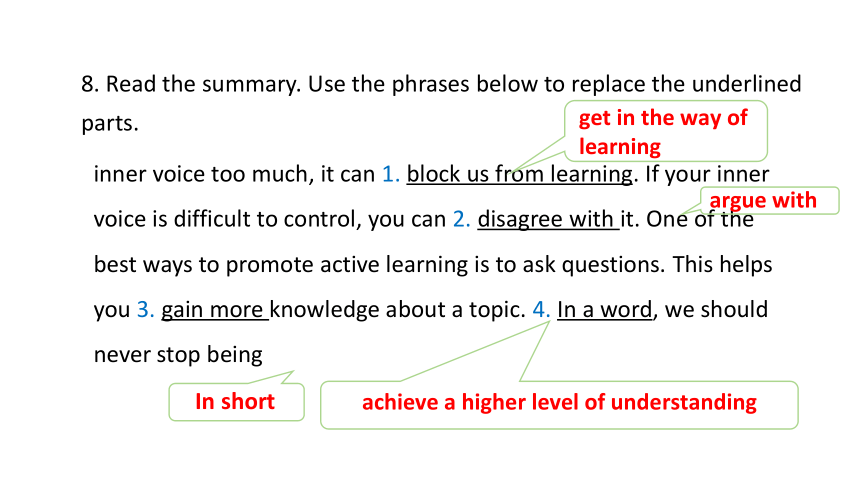
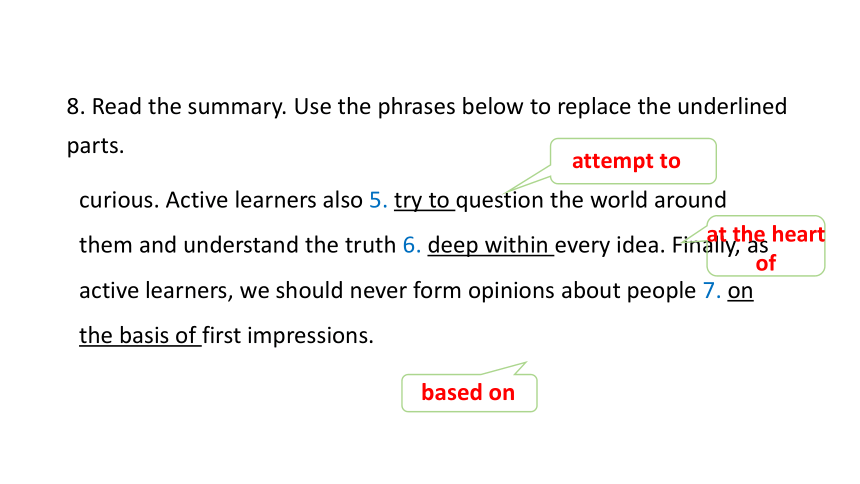
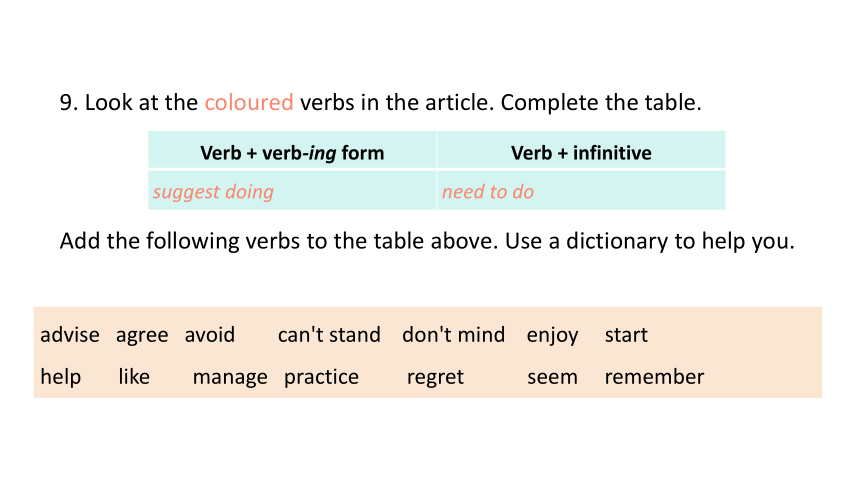

文档简介
(共46张PPT)
Unit 9 Learning
Lesson 1
Active Learning
1. What do most people believe about the human brain Is it true
Most people believe that our brain learns automatically. But, it's not true.
2. Do our brains learn by themselves How can we become active learners Read the first paragraph and answer the questions.
2. Do our brains learn by themselves How can we become active learners Read the first paragraph and answer the questions.
2. What is active learning
Active learning is training ourselves to be better learners, to actively take part in the learning process.
3. What is Kevin Daum going to talk about in the article
Kevin Daum is going to talk about how to take an active role in your learning.
3. Read the text quickly. Write the subheadings before the corresponding paragraphs.
· Ask questions
· Get to the truth
· Listen to the outer voice
· Focus on the message
· Argue with your inner voice
1. ___________________________
2. ___________________________
3. ___________________________
4. ___________________________
5. ___________________________
Argue with your inner voice
Ask questions
Get to the truth
Focus on the message
Listen to the outer voice
6. Are the following ways of learning correct according to Kevin Daum Write T (true) or F (false). If not, what should we do Why
1. When in class, focus on the voice expressing your own opinion. ( )
F
be open-minded and focus on what the speaker/writer is saying.
2. If you think a speaker is wrong, argue with him / her. ( )
F
think about why the speaker/writer may be right.
6. Are the following ways of learning correct according to Kevin Daum
3. Be curious to find more information about the topic. ( )
T
4. Believe what is said in books. ( )
5. Only engage in classes of your favourite teacher's. ( )
F
Find the truth at the heart of each idea.
F
Separate the message from the messenger. You can learn something from people you dislike.
8. Read the summary. Use the phrases below to replace the underlined parts.
In short based on at the heart of attempt to argue with achieve a higher level of understanding get in the way of learning
There are many things we can do to become better learners. We all have two voices. Our inner voice tells us personal opinions and our outer voice deals with others' opinions and things we have heard. If we listen to our
8. Read the summary. Use the phrases below to replace the underlined parts.
inner voice too much, it can 1. block us from learning. If your inner voice is difficult to control, you can 2. disagree with it. One of the best ways to promote active learning is to ask questions. This helps you 3. gain more knowledge about a topic. 4. In a word, we should never stop being
get in the way of learning
argue with
In short
achieve a higher level of understanding
8. Read the summary. Use the phrases below to replace the underlined parts.
curious. Active learners also 5. try to question the world around them and understand the truth 6. deep within every idea. Finally, as active learners, we should never form opinions about people 7. on the basis of first impressions.
attempt to
at the heart of
based on
9. Look at the coloured verbs in the plete the table.
Verb + verb-ing form Verb + infinitive
suggest doing need to do
Add the following verbs to the table above. Use a dictionary to help you.
advise agree avoid can't stand don't mind enjoy start
help like manage practice regret seem remember
Verb + verb-ing form Verb + infinitive
9. Add the following verbs to the table above. Use a dictionary to help you.
suggest, keep, risk, end up, try, cannot help, advise, avoid, can't stand, don't mind, enjoy, start, like, practise, regret, remember
need, attempt, try, refuse, agree, start, help, like, manage, regret, seem, remember
plete the text with the correct form of the verbs in brackets.
Recently, I've managed 1. ____________ (become) a more active learner. When I'm reading a book or listening to my teacher, I try 2. ____________ (forget) what I've learnt before or what I think about the book or the person giving me the information and practise 3. ________________ (concentrate) on the information itself. At the beginning, I found it difficult to do this and I couldn't help 4. _____________ (question) the
to become
to forget
concentrating
questioning
plete the text with the correct form of the verbs in brackets.
ideas I was reading or hearing. But now I've learnt to avoid 5. ____________ (listen) to my inner voice all the time and sometimes I even argue with it. On the other hand, I also attempt 6. ____________ (ask) as many questions as I can. I ask my teachers a lot of questions and I've noticed that the answers to the questions have really helped me understand the topic a lot better.
listening
to ask
Lesson 2 Language Learning Tips
2. Listen to an interview about effective ways of learning English. Which topics are mentioned
How to:
increase knowledge of English learn new words
use a dictionary learn grammar
deal with unfamiliar words be a good learner
√
√
√
√
3. Listen again. Complete the missing information.
1. What is Dr. Smith's advice on effective English learning
Dr. Smith's advice is to ______________________________ of English beyond the classroom. One way to do that is ________________________. He recommends that you try _________________________________. The other way is to _________________.
increase your knowledge
by reading more
simplified classic literature
listen more
3. Listen again. Complete the missing information.
2. What is his suggestion on learning words
Firstly, you should __________________________. A lot of the time, you'll be able to _______________________ of an
unfamiliar word without __________________. Also, you should learn ____________________. For example, we say "open the book", but "turn on the computer".
learn words in context
guess the meaning
looking it up
words in chunks
3. Listen again. Complete the missing information.
3. What advice does he give on learning grammar
Just memorising the rules is ________________. His advice is that when you learn a grammar rule, you should try to use it in _________________________________. By doing so, you'll be learning grammar in a more natural way than from a grammar book.
not helpful
speaking and writing activities
1. Do you find Dr. Smith's advice helpful
2. What are other ways to learn English vocabulary and grammar effectively
2. Writing and rewriting can be helpful.
Translating and back translating can also be helpful.
Watching movies and TV series and dubbing is another possible way.
4. Pair Work Discuss the questions.
6. Listen to the plete the notes in the table. What differences between British and American English are mentioned List the examples.
Aspects Examples
ways of pronouncing words water, tomato …
example,
dancing in the classroom
uses of words
subway/ underground (tube), lift/ elevator, football/ soccer
7. Listen and plete the sentences in the Talk Builder.
Showing Interest (1)
1 -We have different ways of pronouncing words. For example, …
-That's odd! _____________________________! Do they still mean the same thing
2 -I say "example" and "dancing in the classroom", but Robert…
_______________! How do people...
They sound so different
Ah/ Wow
7. Listen and plete the sentences in the Talk Builder.
Showing Interest (1)
3 -We say "lift", but Americans say "elevator".
-_______________!
4 -The American "subway" is called the "underground" in the UK, or the "tube" in London.
-_______________! I never realized…
Interesting
Wow/ Ah
Lesson 3
Epidemics Explained
4. Read the text again. Write T (true) or F (false). Correct the false statements.
( ) 1. We remember certain events in our childhood, because we experienced many of them for the first time, and we felt strongly about them at the time.
( ) 2. When we tell a story many times, we forget important details.
T
F
We can remember them clearly.
4. Read the text again. Write T (true) or F (false). Correct the false statements.
( ) 3. Stephen Wiltshire has a photographic memory because he can draw a detailed picture of a city from memory after flying over it.
F
He is good at remembering particular things but does not have a photographic memory.
( ) 4. It has been proved that some people have a photographic memory.
F
No one has been proved to have a photographic memory.
4. Read the text again. Write T (true) or F (false). Correct the false statements.
( ) 5. The sharpest loss of memory occurs during the first five days.
F
The sharpest loss of memory occurs during the very early period after learning.
( ) 6. Our memory starts to get worse in middle age.
F
Our memory starts to get worse after the age of 25.
6. Match the following suggestions with the four questions and put them back in the pare your suggestions with the expert's suggestions.
A. What can we learn from all this When remembering something new, try to connect it to our emotions. It is important to connect it with what we already know. Also, we can try to retell what we have learnt to a few others.
Para 1
6. Match the following suggestions with the four questions and put them back in the pare your suggestions with the expert's suggestions.
B. Therefore, one of the golden rules to increase how much we remember is to review the material periodically, especially during the first day after learning. This "spaced review" soon after learning helps build stronger memories and it is more effective than waiting to review everything before exams.
Para 3
6. Match the following suggestions with the four questions and put them back in the pare your suggestions with the expert's suggestions.
C. So take it easy. You are at a good age in terms of your memory. Make good use of it!
Para 4
6. Match the following suggestions with the four questions and put them back in the pare your suggestions with the expert's suggestions.
D. As most of us do not have amazing memories like them, when memorising detailed learning materials, we simply need to focus on the important ideas and be curious about what we learn. Asking questions about what we learn also helps with memorisation. Another effective technique to remember things is to group similar ideas or information together so that they can be easily connected to things that are already known.
Para 2
7. What truths about memory does Jemima Gryaznov discuss in the text What advice does she give to improve one's memory
1
Truth:
Advice:
We remember things that have strong connections in our mind, especially emotional connections.
We need to make strong connections with things we want to remember in our mind, especially emotional connections.
7. What truths about memory does Jemima Gryaznov discuss in the text What advice does she give to improve one's memory
2
Truth:
Advice:
Nobody has a photographic memory.
We need to focus on the important ideas and be curious about what we learn when memorising complex learning materials.
7. What truths about memory does Jemima Gryaznov discuss in the text What advice does she give to improve one's memory
3
Truth:
Advice:
The sharpest loss of memory occurs during the very early period after learning.
We need to review the information at regular intervals, especially in the first day after learning it.
7. What truths about memory does Jemima Gryaznov discuss in the text What advice does she give to improve one's memory
4
Truth:
Advice:
Our memory reaches its full power at the age of 25.
We need to train our memory to remember more when we’re older.
8. Group Work Think and share.
1. How has the expert tried to make her statements to each question convincing What methods has she used and what signal words can you find
To make her statements convincing the expert used:
examples: For example...
figures: a famous forgetting curve
quote: According to...
numbers: 25, 200, 40
8. Group Work Think and share.
2. Are there any answers given by Jemima Gryaznov that are not convincing to you What are your doubts
Underline the most and least convincing words in the text that Jemima Gryazov puts forward.
Discuss what methods she uses to convince others.
9. Replace the underlined words and phrase with the words from the text.
1. Jemima Gryaznov thinks people remember things that have strong sentimental attachment.
2. When we do things with enthusiasm, we tend to remember them well.
3. When we try to remember detailed materials, we should focus on the important ideas.
emotional
excitement
memorise
9. Replace the underlined words and phrase with the words from the text.
4. Jemima Gryaznov suggested another effective method to remember things: grouping similar ideas or information together.
5. A good strategy to increase memory is to review the material you are trying to remember often.
technique
periodically
10. Circle the subjects of the sentences in the Sentence Builder. Then use the correct form of the verbs to complete the sentences.
Subject-Verb Agreement
· Retelling events ____________ (help) fix experiences in our memories.
· There ____________ (be) some people who do have amazing memories.
Sentence Builder
helps
are
10. Circle the subjects of the sentences in the Sentence Builder. Then use the correct form of the verbs to complete the sentences.
Subject-Verb Agreement
· They ____________ (be) both good at remembering particular things for a limited time.
· One of the golden rules to increase how much we remember ____________ (be) to review the material periodically.
Sentence Builder
are
is
11. Choose the correct options.
1. If anybody has / have any tips for memorising information, I would like to hear them.
2. Many experts says / say that you should review information periodically after you learn it.
3. Each of the students is / are trying one of these memorising techniques this week.
11. Choose the correct options.
4. Both of my English teachers tells / tell me to ask questions to identify the most important information I need to remember.
5. Writing information down clearly makes / make it easier for you to review it later.
Writing Workshop
2. Read the learning reflection. List the things the writer has reflected on.
What he's learnt
The difference between what he knew before and what he knows now
What he found interesting in what he has learnt
What changes he's going to make to his life as a result of what he's learnt
Thank you
Unit 9 Learning
Lesson 1
Active Learning
1. What do most people believe about the human brain Is it true
Most people believe that our brain learns automatically. But, it's not true.
2. Do our brains learn by themselves How can we become active learners Read the first paragraph and answer the questions.
2. Do our brains learn by themselves How can we become active learners Read the first paragraph and answer the questions.
2. What is active learning
Active learning is training ourselves to be better learners, to actively take part in the learning process.
3. What is Kevin Daum going to talk about in the article
Kevin Daum is going to talk about how to take an active role in your learning.
3. Read the text quickly. Write the subheadings before the corresponding paragraphs.
· Ask questions
· Get to the truth
· Listen to the outer voice
· Focus on the message
· Argue with your inner voice
1. ___________________________
2. ___________________________
3. ___________________________
4. ___________________________
5. ___________________________
Argue with your inner voice
Ask questions
Get to the truth
Focus on the message
Listen to the outer voice
6. Are the following ways of learning correct according to Kevin Daum Write T (true) or F (false). If not, what should we do Why
1. When in class, focus on the voice expressing your own opinion. ( )
F
be open-minded and focus on what the speaker/writer is saying.
2. If you think a speaker is wrong, argue with him / her. ( )
F
think about why the speaker/writer may be right.
6. Are the following ways of learning correct according to Kevin Daum
3. Be curious to find more information about the topic. ( )
T
4. Believe what is said in books. ( )
5. Only engage in classes of your favourite teacher's. ( )
F
Find the truth at the heart of each idea.
F
Separate the message from the messenger. You can learn something from people you dislike.
8. Read the summary. Use the phrases below to replace the underlined parts.
In short based on at the heart of attempt to argue with achieve a higher level of understanding get in the way of learning
There are many things we can do to become better learners. We all have two voices. Our inner voice tells us personal opinions and our outer voice deals with others' opinions and things we have heard. If we listen to our
8. Read the summary. Use the phrases below to replace the underlined parts.
inner voice too much, it can 1. block us from learning. If your inner voice is difficult to control, you can 2. disagree with it. One of the best ways to promote active learning is to ask questions. This helps you 3. gain more knowledge about a topic. 4. In a word, we should never stop being
get in the way of learning
argue with
In short
achieve a higher level of understanding
8. Read the summary. Use the phrases below to replace the underlined parts.
curious. Active learners also 5. try to question the world around them and understand the truth 6. deep within every idea. Finally, as active learners, we should never form opinions about people 7. on the basis of first impressions.
attempt to
at the heart of
based on
9. Look at the coloured verbs in the plete the table.
Verb + verb-ing form Verb + infinitive
suggest doing need to do
Add the following verbs to the table above. Use a dictionary to help you.
advise agree avoid can't stand don't mind enjoy start
help like manage practice regret seem remember
Verb + verb-ing form Verb + infinitive
9. Add the following verbs to the table above. Use a dictionary to help you.
suggest, keep, risk, end up, try, cannot help, advise, avoid, can't stand, don't mind, enjoy, start, like, practise, regret, remember
need, attempt, try, refuse, agree, start, help, like, manage, regret, seem, remember
plete the text with the correct form of the verbs in brackets.
Recently, I've managed 1. ____________ (become) a more active learner. When I'm reading a book or listening to my teacher, I try 2. ____________ (forget) what I've learnt before or what I think about the book or the person giving me the information and practise 3. ________________ (concentrate) on the information itself. At the beginning, I found it difficult to do this and I couldn't help 4. _____________ (question) the
to become
to forget
concentrating
questioning
plete the text with the correct form of the verbs in brackets.
ideas I was reading or hearing. But now I've learnt to avoid 5. ____________ (listen) to my inner voice all the time and sometimes I even argue with it. On the other hand, I also attempt 6. ____________ (ask) as many questions as I can. I ask my teachers a lot of questions and I've noticed that the answers to the questions have really helped me understand the topic a lot better.
listening
to ask
Lesson 2 Language Learning Tips
2. Listen to an interview about effective ways of learning English. Which topics are mentioned
How to:
increase knowledge of English learn new words
use a dictionary learn grammar
deal with unfamiliar words be a good learner
√
√
√
√
3. Listen again. Complete the missing information.
1. What is Dr. Smith's advice on effective English learning
Dr. Smith's advice is to ______________________________ of English beyond the classroom. One way to do that is ________________________. He recommends that you try _________________________________. The other way is to _________________.
increase your knowledge
by reading more
simplified classic literature
listen more
3. Listen again. Complete the missing information.
2. What is his suggestion on learning words
Firstly, you should __________________________. A lot of the time, you'll be able to _______________________ of an
unfamiliar word without __________________. Also, you should learn ____________________. For example, we say "open the book", but "turn on the computer".
learn words in context
guess the meaning
looking it up
words in chunks
3. Listen again. Complete the missing information.
3. What advice does he give on learning grammar
Just memorising the rules is ________________. His advice is that when you learn a grammar rule, you should try to use it in _________________________________. By doing so, you'll be learning grammar in a more natural way than from a grammar book.
not helpful
speaking and writing activities
1. Do you find Dr. Smith's advice helpful
2. What are other ways to learn English vocabulary and grammar effectively
2. Writing and rewriting can be helpful.
Translating and back translating can also be helpful.
Watching movies and TV series and dubbing is another possible way.
4. Pair Work Discuss the questions.
6. Listen to the plete the notes in the table. What differences between British and American English are mentioned List the examples.
Aspects Examples
ways of pronouncing words water, tomato …
example,
dancing in the classroom
uses of words
subway/ underground (tube), lift/ elevator, football/ soccer
7. Listen and plete the sentences in the Talk Builder.
Showing Interest (1)
1 -We have different ways of pronouncing words. For example, …
-That's odd! _____________________________! Do they still mean the same thing
2 -I say "example" and "dancing in the classroom", but Robert…
_______________! How do people...
They sound so different
Ah/ Wow
7. Listen and plete the sentences in the Talk Builder.
Showing Interest (1)
3 -We say "lift", but Americans say "elevator".
-_______________!
4 -The American "subway" is called the "underground" in the UK, or the "tube" in London.
-_______________! I never realized…
Interesting
Wow/ Ah
Lesson 3
Epidemics Explained
4. Read the text again. Write T (true) or F (false). Correct the false statements.
( ) 1. We remember certain events in our childhood, because we experienced many of them for the first time, and we felt strongly about them at the time.
( ) 2. When we tell a story many times, we forget important details.
T
F
We can remember them clearly.
4. Read the text again. Write T (true) or F (false). Correct the false statements.
( ) 3. Stephen Wiltshire has a photographic memory because he can draw a detailed picture of a city from memory after flying over it.
F
He is good at remembering particular things but does not have a photographic memory.
( ) 4. It has been proved that some people have a photographic memory.
F
No one has been proved to have a photographic memory.
4. Read the text again. Write T (true) or F (false). Correct the false statements.
( ) 5. The sharpest loss of memory occurs during the first five days.
F
The sharpest loss of memory occurs during the very early period after learning.
( ) 6. Our memory starts to get worse in middle age.
F
Our memory starts to get worse after the age of 25.
6. Match the following suggestions with the four questions and put them back in the pare your suggestions with the expert's suggestions.
A. What can we learn from all this When remembering something new, try to connect it to our emotions. It is important to connect it with what we already know. Also, we can try to retell what we have learnt to a few others.
Para 1
6. Match the following suggestions with the four questions and put them back in the pare your suggestions with the expert's suggestions.
B. Therefore, one of the golden rules to increase how much we remember is to review the material periodically, especially during the first day after learning. This "spaced review" soon after learning helps build stronger memories and it is more effective than waiting to review everything before exams.
Para 3
6. Match the following suggestions with the four questions and put them back in the pare your suggestions with the expert's suggestions.
C. So take it easy. You are at a good age in terms of your memory. Make good use of it!
Para 4
6. Match the following suggestions with the four questions and put them back in the pare your suggestions with the expert's suggestions.
D. As most of us do not have amazing memories like them, when memorising detailed learning materials, we simply need to focus on the important ideas and be curious about what we learn. Asking questions about what we learn also helps with memorisation. Another effective technique to remember things is to group similar ideas or information together so that they can be easily connected to things that are already known.
Para 2
7. What truths about memory does Jemima Gryaznov discuss in the text What advice does she give to improve one's memory
1
Truth:
Advice:
We remember things that have strong connections in our mind, especially emotional connections.
We need to make strong connections with things we want to remember in our mind, especially emotional connections.
7. What truths about memory does Jemima Gryaznov discuss in the text What advice does she give to improve one's memory
2
Truth:
Advice:
Nobody has a photographic memory.
We need to focus on the important ideas and be curious about what we learn when memorising complex learning materials.
7. What truths about memory does Jemima Gryaznov discuss in the text What advice does she give to improve one's memory
3
Truth:
Advice:
The sharpest loss of memory occurs during the very early period after learning.
We need to review the information at regular intervals, especially in the first day after learning it.
7. What truths about memory does Jemima Gryaznov discuss in the text What advice does she give to improve one's memory
4
Truth:
Advice:
Our memory reaches its full power at the age of 25.
We need to train our memory to remember more when we’re older.
8. Group Work Think and share.
1. How has the expert tried to make her statements to each question convincing What methods has she used and what signal words can you find
To make her statements convincing the expert used:
examples: For example...
figures: a famous forgetting curve
quote: According to...
numbers: 25, 200, 40
8. Group Work Think and share.
2. Are there any answers given by Jemima Gryaznov that are not convincing to you What are your doubts
Underline the most and least convincing words in the text that Jemima Gryazov puts forward.
Discuss what methods she uses to convince others.
9. Replace the underlined words and phrase with the words from the text.
1. Jemima Gryaznov thinks people remember things that have strong sentimental attachment.
2. When we do things with enthusiasm, we tend to remember them well.
3. When we try to remember detailed materials, we should focus on the important ideas.
emotional
excitement
memorise
9. Replace the underlined words and phrase with the words from the text.
4. Jemima Gryaznov suggested another effective method to remember things: grouping similar ideas or information together.
5. A good strategy to increase memory is to review the material you are trying to remember often.
technique
periodically
10. Circle the subjects of the sentences in the Sentence Builder. Then use the correct form of the verbs to complete the sentences.
Subject-Verb Agreement
· Retelling events ____________ (help) fix experiences in our memories.
· There ____________ (be) some people who do have amazing memories.
Sentence Builder
helps
are
10. Circle the subjects of the sentences in the Sentence Builder. Then use the correct form of the verbs to complete the sentences.
Subject-Verb Agreement
· They ____________ (be) both good at remembering particular things for a limited time.
· One of the golden rules to increase how much we remember ____________ (be) to review the material periodically.
Sentence Builder
are
is
11. Choose the correct options.
1. If anybody has / have any tips for memorising information, I would like to hear them.
2. Many experts says / say that you should review information periodically after you learn it.
3. Each of the students is / are trying one of these memorising techniques this week.
11. Choose the correct options.
4. Both of my English teachers tells / tell me to ask questions to identify the most important information I need to remember.
5. Writing information down clearly makes / make it easier for you to review it later.
Writing Workshop
2. Read the learning reflection. List the things the writer has reflected on.
What he's learnt
The difference between what he knew before and what he knows now
What he found interesting in what he has learnt
What changes he's going to make to his life as a result of what he's learnt
Thank you
同课章节目录
- Unit 7 Art
- Lesson 1 Masterpieces
- Lesson 2 Beijing Opera
- Lesson 3 A Musical Genius
- Unit 8 Green living
- Lesson 1 Roots and Shoots
- Lesson 2 Greening the Desert
- Lesson 3 "White Bikes" on the Road
- Unit 9 Learning
- Lesson 1 Active Learning
- Lesson 2 Language Learning Tips
- Lesson 3 The Secrets of Your Memory
